6. In the Mood for Love (2000) – Kar-Wai Wong
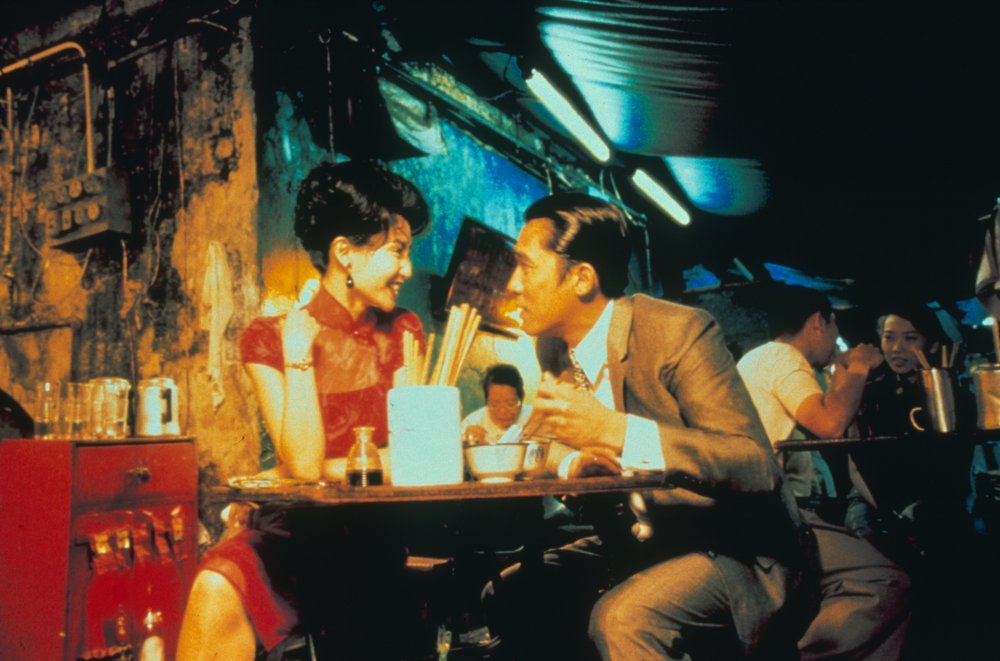
This film, by talented Chinese director Kar-Wai Wong, was shot by subversive cinematographer Christopher Doyle without a traditional script. It displays a rather strange dynamic between two neighbors: great Wong collaborator Tony Leung as Chow Mo-wan and Maggie Cheung as Su Li-zhen. Both of the characters are married and both of their spouses spend lots of time away from home.
As the movie runs, they both realize that their respective spouses are cheating with the spouse of the other. The doubt and the fear of acknowledging this is wonderfully expressed by the performances of both actors, the blocking, and the framing of Doyle and Wong. They never say that they know what is going on, but we know that they know; it is all in the subtext.
Through the film, desire starts growing between them; neither of them want to be what their couples are, but the desire is there. The exquisite language of the film expresses this denial and desire without need for complex dialogues; it is all in movement (or the lack of it) and glances. The musical theme “Quizás, quizás, quizás” (Maybe, maybe, maybe) by Nat King Cole echoes the perpetual possibly of their love and desire.
7. Anomalisa (2015) – Charlie Kaufman & Duke Johnson
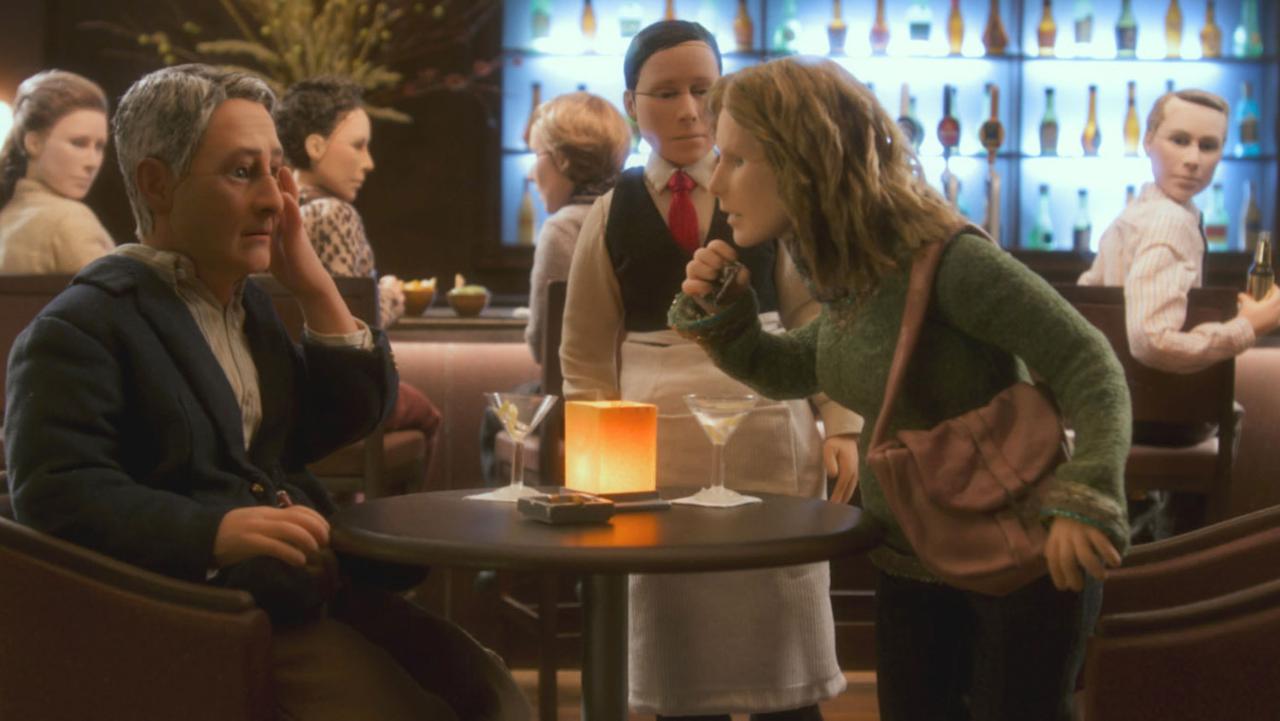
Few films are as violently honest as this stop-motion masterpiece in which a successful writer, father and husband by the name of Michael Stone (David Thewlis) finds a young woman named Lisa Hesselman (Jennifer Jasson), with a voice that sounds different from everybody else (Tom Noonan). The film addresses the profound loneliness from the phenomenon of every relationship, degrading into a repetition of the relationship one has with the rest of the world.
When Michael, overwhelmed by his routine, meets Lisa in a hotel, he is amazed by her. Even though she is accustomed to being overshadowed by his friend, this time Michael is completely interested and focused on her. He says that she is special, and that she is a beautiful anomaly, which the film expresses by giving her a different voice from everybody else.
The hotel becomes the scenery of surreal dreams which confront Michael and his nature; his infatuation for Lisa is only temporary and soon her voice starts changing. Michael is irremediably alone as everybody else, overwhelmed by a generic voice that appears in everyone.
8. Drama/Mex (2006) – Gerardo Naranja
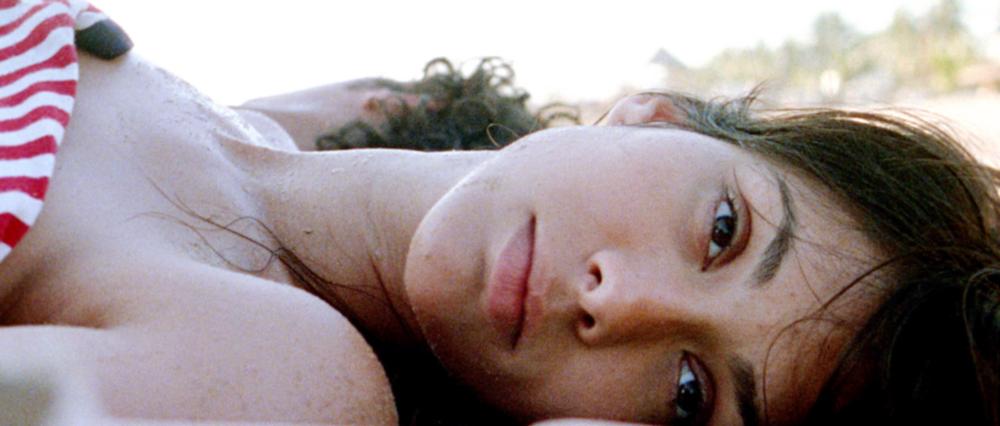
This almost ignored film by Mexican director Gerardo Naranjo is set in the Mexican resort beach city of Acapulco and is all about relationships. Without a strict chronological order, we see the story of a father named Jaime (Fernando Becerril) who’s tired of life, who goes to the beach with the intention of killing himself, and who is stopped by a young prostitute named Tigrillo. Simultaneously, we see Fernanda (Diana Garcia), a young adult dealing with the comeback of her old and violent lover Chano, who asks her to leave her boyfriend Gonzalo (Juan Pablo Castañeda) to escape Acapulco with him.
The stories intertwine as the musical theme (“Moonlight Sonata”) appears constantly in different parts of the film, managing to show how the relations of the characters between each other are transforming. This theme unifies the different stories, whose arcs lead them emotionally to a continuous disembarrassing of social norms and taboos, and literally to the beach. Naranjo manages to create a symbol that we also see in “Y Tu Mama También,” with the beach as a symbol of freedom.
9. Floating Weeds (1959) – Yasujirō Ozu
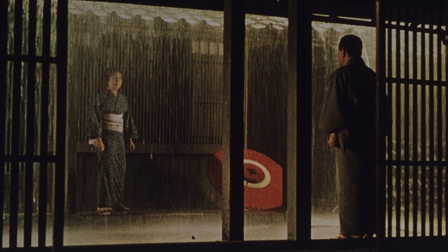
A relationship is a continuous definition of the other, and the other in relation to ourselves; we are constantly performing roles that fulfill certain expectations, and expect some things of the other according to the roles. We do not always choose the role in which we are bound to perform, and sometimes we are not able or do not want to do it. The characters in Yasujirō Ozu’s remake of one of his own movies find themselves in this situation, bound to the conflict of the expectations of others and their will.
Ganjiro Nakamura plays Komajiro Arashi, a father, an old friend and a lover. He finds himself in frustrating circumstances as he tries to fulfill the role of a father to a son (Hiroshi Kawaguchi) who thinks he is his uncle, and a lover (Machiko Kyo) who thinks he is getting involved with his old lover (Haruko Sugimura), who only is his friend. At the same time, the son is infatuated with an actress against the will of Komajiro, who tries to talk with the authority of a father when he is only an uncle.
As always, Ozu expresses discretion through silence, pauses, and glances of the pain of being expected to do something when one does not want to, and the pain of seeing these expectations crushed – but also the capacity to forgive, to see beyond these expectations. The process of forgiveness for the love that exists between two people is displayed by the continuous presence of the musical theme, which never goes away, even though the circumstances change.
10. Cyrano de Bergerac (1990) – Jean-Paul Rappeneau
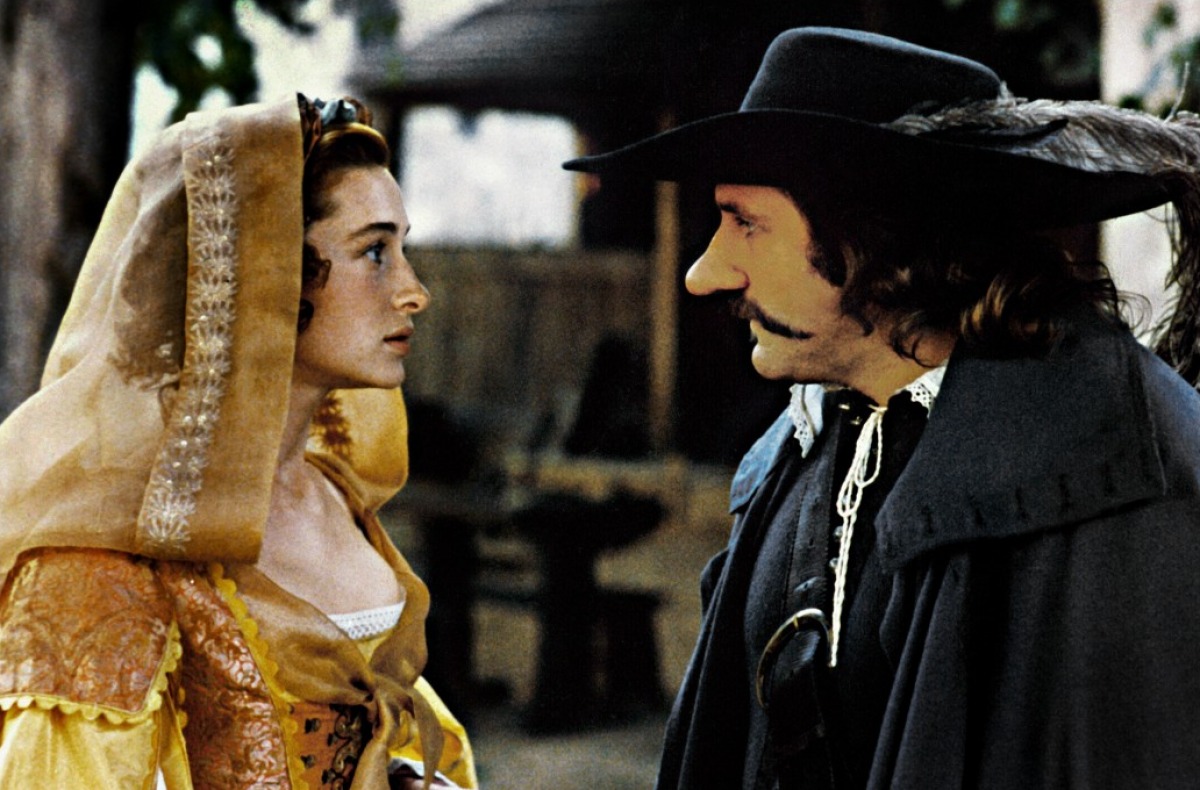
A romantic, proud and stubborn man against the world, irremediably infatuated with his cousin Roxane (Anne Brochet), he does not dare to confess his love because he fears that his large nose makes him unworthy of her love. Thus, he is bound to declare his love through a young handsome man with the name of Christian Neuvillette (Vincent Perez), with whom he develops a great friendship. This pathetic and romantic hero is Cyrano de Bergerac (Gérard Depardieu).
The adaptation of Edmond Rostand’s play was handled by legendary screenwriter Jean Claude Carrière and Rappeneau himself. In the film, one of the most iconic love triangles (and probably the noblest one) not only in film history but in the history of literature, gives place to scenes in which relationships are explored through masks (special mention to the balcony scene). It is a constant mystery whether Roxane loves Christian for his appearance or for the word of Cyrano.
One of the many things that made this love triangle special is that there is no resentment between the lovers of Roxane. Cyrano has taken Christian as his protector, and goes even so far as to help him and Roxane get married. Unlike most of the films on this list, the love that Cyrano professes to Roxane is not destroyed or corrupted by time; he holds on until the very end, along with what he calls his panache.